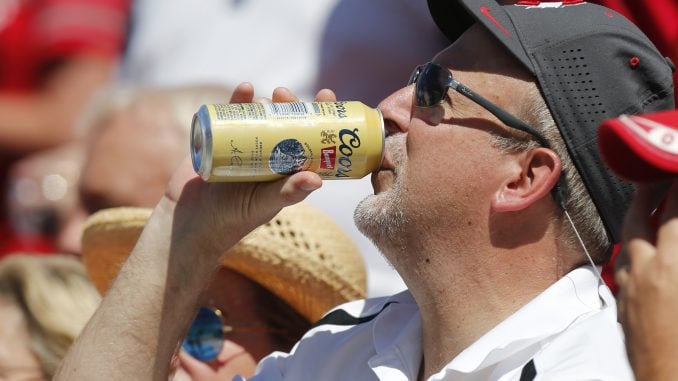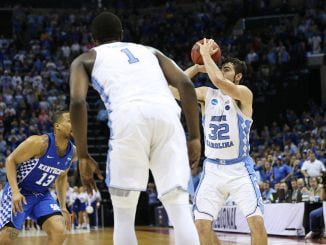
Fans at NC State or UNC games may be able to celebrate big plays — or drown their sorrows — with an adult beverage in the near future.
The North Carolina House of Representatives passed House Bill 389 earlier this month, which would allow the state’s public colleges and universities to allow alcohol sales at stadiums, athletic facilities and arenas located on school property.
The bill specifically excludes mixed drinks, but it opens the door for beer and wine sales at college games in the future. It first needs to be passed by the N.C. Senate, then each individual college will need to decide how it will handle the freedom to offer alcoholic beverages.
“We’ve heard from law enforcement, administrators and students and believe this is a positive step for safety and economic growth,” state Rep. John Bell (R-Wayne) said.
Bell introduced the bill in the house, while Majority Whip Rick Gunn (R-Alamance) brought it to the Senate.
“This is a great economic move for public universities and all of the college sports fans in our state,” Gunn said.
Obviously, alcohol sales at athletic events would open up a new revenue stream for colleges.
“I think our AD brethren would suggest somewhere between $200,000 and $300,000 every year,” NC State athletic director Debbie Yow said in a 2017 interview with The Associated Press.
Schools around the country that have already taken the step of green lighting beer and wine at games would indicate that Yow’s estimate is on the conservative side.
CBS found that West Virginia football brought in $600,000 from beer and wine sales in 2016. In 2015, athletic director Shane Lyons told The New York Times, “approximately $500,000 a year just in beer comes back to us.”
West Virginia’s football stadium is approximately the same capacity as NC State’s Carter-Finley Stadium. A similar influx of cash from beer sales would represent an increase to the school’s entire athletics revenue stream of more than half a percentage point.
That doesn’t include money coming from sales of wine, alcohol sales at basketball or other events, or income that could potentially come from sponsorship and advertising deals with beer and wine companies. For instance, New Belgium brewing company sponsored an end zone pavilion at Colorado State football games in a deal that brought the university $4.3 million in additional income. A similar arrangement, coupled with in-stadium beer sales, would boost NC State’s athletics revenue stream by more than 5.5 percent.
Texas and Ohio State, both of whom play in much larger stadiums with capacities over 100,000, reported much higher revenue totals from alcohol. Texas made $1.8 million in 2016 and more recent figures show that the Longhorns bring in $530,000 from the sale of alcohol at every home game. Ohio State made $1.35 million in 2017.
In addition to increasing revenue, in-stadium alcohol sales would likely reduce the number of “pass-outs” at Carter-Finley — fans who leave the stadium at halftime, presumably to continue tailgating in the parking lot. The idea is that they return for the second half, although, much to the consternation of Wolfpack coach Dave Doeren, many never find their way back to their seats.
The idea of selling alcohol at college events, when close to three-quarters of the student body in attendance are unable to buy the product legally, is a controversial one, especially considering the problem of binge drinking on campuses. Hall of Fame North Carolina coach Dean Smith campaigned against even allowing alcohol ads to be shown on college telecasts throughout his career.
With athletic attendance flattening and, for many schools, falling, however, the idea has gained more widespread acceptance. Reportedly, 14 of the UNC systems 15 schools have come out in favor of the bill.
Wake Forest, which began allowing alcohol sales to the general public at athletic events in 2016, found the path to acceptance much smoother than the school expected.
“We took two or three years looking at it, studying it, looking at what other people have done to determine if it was applicable to Wake Forest or not,” AD Ron Wellman told the AP. “Eventually, the vote went to a wide sampling of representatives from across the campus. I thought it would be a very controversial topic, (but) we had over 50 people on a couple of different boards at that meeting, and they voted for it unanimously, which shocked me.”
Thus far, colleges that have allowed alcohol sales found that the move has reduced alcohol-related problems at events, not increased them. West Virginia saw incidents drop by 35 percent after beginning regulated sales in 2011. Ohio State saw a similar impact after allowing the sale in 2016.
“By giving NC public universities the option to sell beer and wine at athletic events, this bill will improve safety and encourage local economic development,” Rep. Bell said.
“I applaud the NC House and Leader Bell for passing this important bill and getting it one step closer to becoming law,” Sen. Gunn added.


